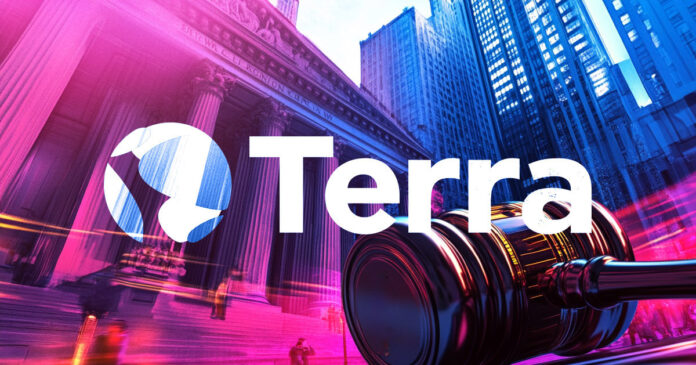
The Securities and Exchange Commission has charged a subsidiary of Jump Crypto, Tai Mo Shan Limited, with misleading investors about Terra USD (UST) after the stablecoin lost its $1 peg.
The regulator alleges that Tai Mo Shan participated in trading designed to create the false impression UST’s advertised algorithm solely sustained its price. When UST lost its peg in May 2021, Terraform Labs enlisted Tai Mo Shan to purchase over $20 million worth of UST, implying that a technical mechanism kept the token’s $1 mark when Tai Mo Shan’s intervention helped restore its level.
The SEC states that Terra’s algorithmic approach did not independently maintain UST’s parity with the dollar, as Terraform implied, but depended on Tai Mo Shan’s purchases. This transaction included incentives that allowed Tai Mo Shan to acquire LUNA at a discounted rate once UST stabilized.
The commission argues that such incentives undercut Terraform’s public claims by showing external support played a significant part in restoring the $1 price. The order also holds Tai Mo Shan responsible for distributing LUNA as unregistered securities in the U.S., where Tai Mo Shan allegedly acted as a statutory underwriter by obtaining tokens from Terraform and quickly selling them into the market.
Tai Mo Shan agreed to pay $73,452,756 in disgorgement, $12,916,153 in prejudgment interest, and a $36,726,378 civil penalty for a total of $123 million. The firm neither admits nor denies the findings but will cease further violating the registration and fraud provisions.
Terra Luna ecosystem collapse
Terra Luna’s ecosystem has been under scrutiny since a 2022 collapse exposed deficiencies in its stablecoin model and damaged market confidence. The original chain, known as Terra Classic (LUNC), persists at significantly lower valuations and utility, while a new Terra (LUNA) fork was launched in an effort to rebuild the network.
Terraform Labs, co-founded by Do Kwon, has faced multiple legal challenges, including an SEC case in which Terraform and Kwon were found liable for fraud and unregistered securities offerings. The firm filed for Chapter 11 bankruptcy in Jan. 2024, reporting assets and liabilities estimated between $100 million and $500 million. Leadership changes further complicated the project’s recovery path, with Chris Amani stepping in as CEO in July 2023 as part of broader efforts to address legal and financial upheaval.
Market participants had already seen Terraform’s reputation damaged by UST’s collapse, contributing to losses estimated at over $40 billion across digital assets. Despite introducing a new token and chain, Terra’s efforts to regain trust have been hindered by ongoing controversies. A co-founder of Three Arrows Capital alleged that Digital Currency Group and FTX colluded to attack Terra LUNA, adding to the project’s complicated record. Terra Classic trades at a fraction of its previous value, and the newer Terra (LUNA) token faces similar downward pressure.
Terraform’s legal complications have unfolded alongside Do Kwon’s conviction in Montenegro for traveling with falsified documents and potential extradition to the United States or South Korea. The environment around Terra has steadily deteriorated since the original UST meltdown.
Regulators have expanded investigations into whether other tokens linked to Terraform qualify as securities, spotlighting disclosures about how assets are offered and promoted. Several Terra-linked tokens have been labeled securities by the SEC, intensifying oversight of issuance protocols and secondary market trading.
Mentioned in this article
Credit: Source link






















 Bitcoin
Bitcoin  Ethereum
Ethereum  XRP
XRP  Tether
Tether  Solana
Solana  USDC
USDC  Dogecoin
Dogecoin  Cardano
Cardano  Lido Staked Ether
Lido Staked Ether  TRON
TRON  Wrapped Bitcoin
Wrapped Bitcoin  Chainlink
Chainlink  Wrapped stETH
Wrapped stETH  Avalanche
Avalanche  Sui
Sui  Stellar
Stellar  Litecoin
Litecoin  Toncoin
Toncoin  Shiba Inu
Shiba Inu  Hedera
Hedera  LEO Token
LEO Token  USDS
USDS  Hyperliquid
Hyperliquid  Polkadot
Polkadot  WETH
WETH  MANTRA
MANTRA  Bitcoin Cash
Bitcoin Cash  Bitget Token
Bitget Token  Ethena USDe
Ethena USDe  Wrapped eETH
Wrapped eETH  Uniswap
Uniswap  Monero
Monero  NEAR Protocol
NEAR Protocol  Pepe
Pepe  WhiteBIT Coin
WhiteBIT Coin  Aave
Aave  Bittensor
Bittensor  Ondo
Ondo  Aptos
Aptos  Internet Computer
Internet Computer  Dai
Dai  Official Trump
Official Trump  Ethereum Classic
Ethereum Classic  Mantle
Mantle  Tokenize Xchange
Tokenize Xchange  OKB
OKB  Gate
Gate  sUSDS
sUSDS  Sonic (prev. FTM)
Sonic (prev. FTM) 
